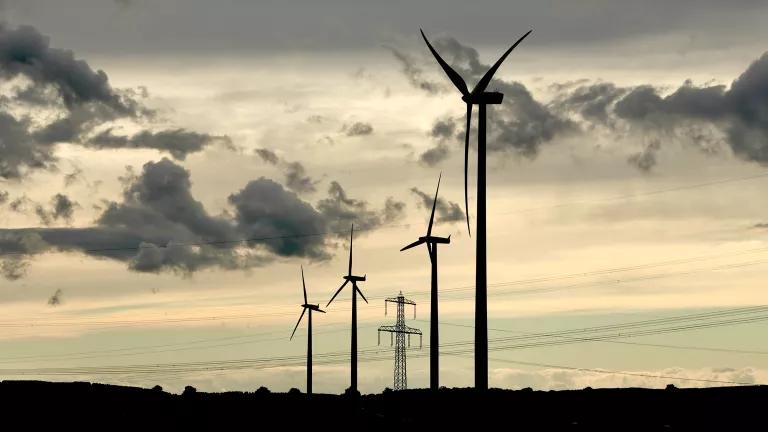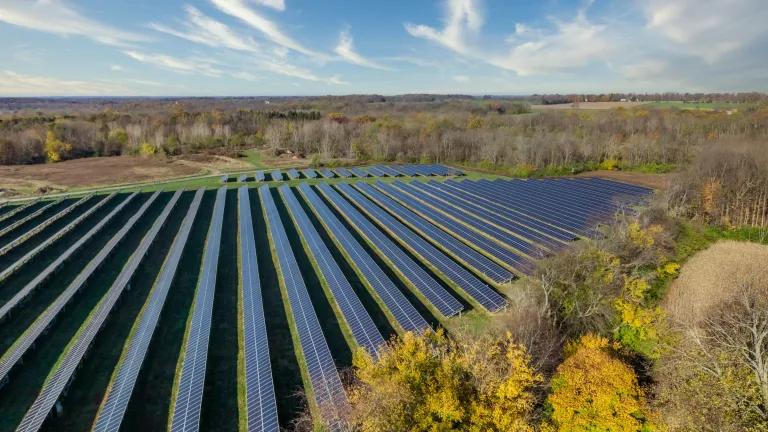By re-electing President Obama, American voters made clear that clean energy is vital to this country, and that wasteful, 19th-century energy does not hold the answers we seek. A majority of Americans voted for the candidate who arguably has done more for clean energy and efficiency than any other president. Voters cast their ballots for an America that is not a wasteland, where oil, gas, forests, clean air and clean water are squandered, but a land of opportunity and innovation, a nation that builds strength through ingenuity and resourcefulness.
This is a president who has met the challenge of waste head-on, particularly in energy. Using efficiency as his tool of choice, Obama has made great strides in slashing energy waste, putting money back in consumers' pockets and boosting the economy at the same time. His historic fuel economy standards are sparking innovations in vehicle and engine design, allowing us to go twice as far on a single gallon of gas by 2025. Detroit is humming again, piling on more than 230,000 jobs across the industry since 2009. Showrooms today already offer twice as many fuel efficient models as they did in 2009, giving more consumers the opportunity to save money on gas.
Overall, his new federal mileage standards will cut our fuel bills by $1.7 trillion, and reduce carbon pollution by an amount equivalent to shutting down 140 coal-fired power plants. Our efficient vehicle fleet will reduce oil imports by one-third, stopping the wasteful flow of energy dollars overseas. Keeping that money at home averts the tragic waste of human capital, by creating 570,000 jobs for people in the United States.
President Obama's Better Buildings Initiative is leveraging private money to cut energy waste in commercial buildings, which are responsible for 20 percent of all the energy consumed in this country. Tightening up our leaky, wasteful buildings will save about $40 billion in energy costs for American businesses over the next decade, while creating tens of thousands of construction jobs and training the next generation of efficiency experts.
Our homes are becoming more efficient, too, thanks to updated standards for appliances and electronics, which have quietly been saving consumers billions of dollars in energy costs over the past few decades. New efficiency standards for clothes washers and dishwashers issued under this administration will save enough electricity to power 700,000 homes, as well as enough water to meet the needs of 3 million Americans.
And a recent directive from President Obama, which encourages investment in industrial efficiency, could save American manufacturers $100 billion in energy costs over the next decade.
In this time of economic recovery, people welcome ways to stretch the value of a dollar. And when the cost savings come along with the added benefit of cleaner air, cleaner water, and a more stable climate, efficiency is a no-brainer. After all, the cleanest energy is the energy we never have to use in the first place. Our current energy system wastes lives, from the 1,300 Americans killed defending fuel convoys in Iraq and Afghanistan, to the thousands of premature deaths each year due to coal-fired power plant pollution. It is as wasteful drain on our economy, costing $83 billion per year to protect our oil imports, and $100 billion in economic losses from death and disease due to power plant pollution. The damage toll due to extreme weather events in the past two years likely tops $116 billion, compared with an $18 billion per year average in the 1980s.
Perhaps that's why Americans remained unmoved by the more than $270 million spent on TV ads promoting oil, gas and coal interests in the two months before the election. Big money couldn't sway public opinion to support an outdated, wasteful system over the economic and environmental promise of clean energy and efficiency. (You could say that that $270 million was wasted.)
The next four years present a critical opportunity to expand our commitment to clean energy and efficiency. We're already seeing the benefits of federal policies that trim energy waste by making our cars, our buildings, and our appliances more efficient. We must continue to push for more of these cost-effective efficiency measures, as well as support the development of clean, renewable energy as an alternative to the wasteful extraction and burning of fossil fuels.
[This post is part of our Wasteland series, featuring people, towns, businesses and industries that are finding innovative ways to cut waste, boost efficiency and save money, time and valuable resources.]



